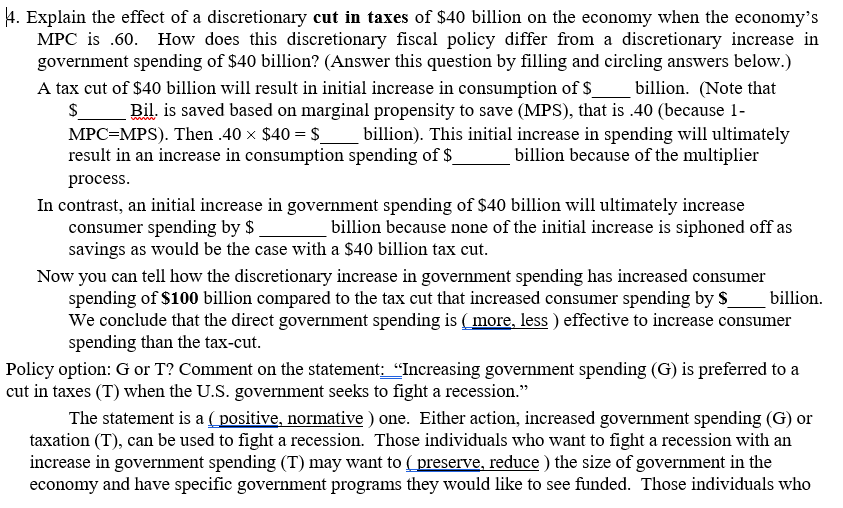4. Explain the effect of a discretionary cut in taxes of $40 billion on the economy when the economy's MPC is .60. How does this discretionary fiscal policy differ from a discretionary increase in government spending of $40 billion? (Answer this question by filling and circling answers below.) A tax cut of $40 billion will result in initial increase in consumption of $ $ MPC=MPS). Then .40 × $40 = $__ billion). This initial increase in spending will ultimately result in an increase in consumption spending of $_ billion. (Note that Bil. is saved based on marginal propensity to save (MPS), that is .40 (because 1- billion because of the multiplier process. In contrast, an initial increase in government spending of $40 billion will ultimately increase consumer spending by $ savings as would be the case with a $40 billion tax cut. billion because none of the initial increase is siphoned off as Now you can tell how the discretionary increase in government spending has increased consumer spending of $100 billion compared to the tax cut that increased consumer spending by $billion. We conclude that the direct government spending is ( more, less ) effective to increase consumer spending than the tax-cut.
4. Explain the effect of a discretionary cut in taxes of $40 billion on the economy when the economy's MPC is .60. How does this discretionary fiscal policy differ from a discretionary increase in government spending of $40 billion? (Answer this question by filling and circling answers below.) A tax cut of $40 billion will result in initial increase in consumption of $ $ MPC=MPS). Then .40 × $40 = $__ billion). This initial increase in spending will ultimately result in an increase in consumption spending of $_ billion. (Note that Bil. is saved based on marginal propensity to save (MPS), that is .40 (because 1- billion because of the multiplier process. In contrast, an initial increase in government spending of $40 billion will ultimately increase consumer spending by $ savings as would be the case with a $40 billion tax cut. billion because none of the initial increase is siphoned off as Now you can tell how the discretionary increase in government spending has increased consumer spending of $100 billion compared to the tax cut that increased consumer spending by $billion. We conclude that the direct government spending is ( more, less ) effective to increase consumer spending than the tax-cut.
Brief Principles of Macroeconomics (MindTap Course List)
8th Edition
ISBN:9781337091985
Author:N. Gregory Mankiw
Publisher:N. Gregory Mankiw
Chapter18: Six Debates Over Macroeconomic Policy
Section: Chapter Questions
Problem 6PA
Related questions
Question

Transcribed Image Text:4. Explain the effect of a discretionary cut in taxes of $40 billion on the economy when the economy's
MPC is .60. How does this discretionary fiscal policy differ from a discretionary increase in
government spending of $40 billion? (Answer this question by filling and circling answers below.)
A tax cut of $40 billion will result in initial increase in consumption of $
billion. (Note that
Bil. is saved based on marginal propensity to save (MPS), that is .40 (because 1-
MPC=MPS). Then .40 × $40 = $_ billion). This initial increase in spending will ultimately
billion because of the multiplier
$
result in an increase in consumption spending of $
process.
In contrast, an initial increase in government spending of $40 billion will ultimately increase
consumer spending by $
savings as would be the case with a $40 billion tax cut.
billion because none of the initial increase is siphoned off as
Now you can tell how the discretionary increase in government spending has increased consumer
spending of $100 billion compared to the tax cut that increased consumer spending by S
We conclude that the direct government spending is ( more, less ) effective to increase consumer
spending than the tax-cut.
billion.
Policy option: G or T? Comment on the statement: "Increasing government spending (G) is preferred to a
cut in taxes (T) when the U.S. government seeks to fight a recession."
The statement is a ( positive, normative ) one. Either action, increased government spending (G) or
taxation (T), can be used to fight a recession. Those individuals who want to fight a recession with an
increase in government spending (T) may want to ( preserve, reduce ) the size of government in the
economy and have specific government programs they would like to see funded. Those individuals who
Expert Solution
This question has been solved!
Explore an expertly crafted, step-by-step solution for a thorough understanding of key concepts.
This is a popular solution!
Trending now
This is a popular solution!
Step by step
Solved in 2 steps

Knowledge Booster
Learn more about
Need a deep-dive on the concept behind this application? Look no further. Learn more about this topic, economics and related others by exploring similar questions and additional content below.Recommended textbooks for you

Brief Principles of Macroeconomics (MindTap Cours…
Economics
ISBN:
9781337091985
Author:
N. Gregory Mankiw
Publisher:
Cengage Learning

Principles of Macroeconomics (MindTap Course List)
Economics
ISBN:
9781285165912
Author:
N. Gregory Mankiw
Publisher:
Cengage Learning

Principles of Macroeconomics (MindTap Course List)
Economics
ISBN:
9781305971509
Author:
N. Gregory Mankiw
Publisher:
Cengage Learning

Brief Principles of Macroeconomics (MindTap Cours…
Economics
ISBN:
9781337091985
Author:
N. Gregory Mankiw
Publisher:
Cengage Learning

Principles of Macroeconomics (MindTap Course List)
Economics
ISBN:
9781285165912
Author:
N. Gregory Mankiw
Publisher:
Cengage Learning

Principles of Macroeconomics (MindTap Course List)
Economics
ISBN:
9781305971509
Author:
N. Gregory Mankiw
Publisher:
Cengage Learning

Principles of Economics, 7th Edition (MindTap Cou…
Economics
ISBN:
9781285165875
Author:
N. Gregory Mankiw
Publisher:
Cengage Learning

Principles of Economics (MindTap Course List)
Economics
ISBN:
9781305585126
Author:
N. Gregory Mankiw
Publisher:
Cengage Learning
